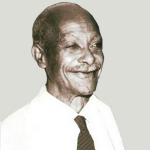Come learn Capoeira Angola at CEDANZE · Academia João Pequeno de Pastinha · Mestre Faísca

MESTRE PASTINHA
The CEDANZE International Institution is daily advertised as: AJPP · CECA
ACADEMIA JOÃO PEQUENO DE PASTINHA - CENTRO ESPORTIVO DE CAPOEIRA ANGOLA
LINEAGE | CEDANZE ASSOCIATION
“Mestre Pastinha… master of Capoeira Angola and Bahian cordiality, being of the highest civilization, man of the people with all their playful mischief, he’s one their famous, one of their greats, one of their oba, of their leaders. He is the first in his art, master of agility and courage, of loyalty and fraternal sociability. In his school in the Pelourinho, Mestre Pastinha produces Brazilian culture of the most real and best kind. Every time I see this 75 year-old man playing capoeira, dancing samba, exhibiting his art with the élan of a teenager, I feel the invincible strength of the Bahian people, surviving and building forth in spite of their infinite poverty, their misery, their abandon. In itself the people finds strength and makes its own greatness. Symbol and face of this people is Mestre Pastinha”.
Jorge Amado
Biographical summary of Mestre Benedito et Mestre Pastinha
“Each one is each one, nobody plays my way”
This famous statement by Mestre Pastinha is one of his most profound, for it suggests the understanding that each person is different with his/her own particularities. However, the method of Capoeira Angola he developed has persisted until this day through his disciples and capoeira students worldwide.
Vicente Ferreira Pastinha, universally known as Mestre Pastinha, was born on April 5 in 1889 in Salvador. His name became immortal through his dedication to Capoeira Angola, in which he lived out many dreams, joys and sacrifices. His parents were José Senor, a Spanish merchant in downtown Salvador, and Maria Eugênia Ferreira, black, from Santo Amaro da Purificação in the region of the Recôncavo Baiano.
Meste Pastinha was initiated to Capoeira when he was only 10 years-old. An African man called Benedito noticed that he was being bullied by a stronger kid. One day he called him and said: “Boy, come here. I’m going to teach you something”. From then on he taught him movements that became foundational for Capoeira Angola.
Vicente Ferreira Pastinha had many different jobs and went to school in the School of Arts and Crafts where he learned painting. Among other activities, he sold newspapers, polished shoes, watched over a gambling parlor and painted. He described himself as an artist of painting and Capoeira. Also with a strong poetic vein, he authored aphorisms that contributed to his notoriety.
In 1902, when he was 12 years-old, he enlisted in the navy and started to attend a sailor apprentice school where he started to teach capoeira to his colleagues until leaving as a 20-year-old. About 30 years later, in 1941, Bahia witnessed important cultural changes known through the works of the writer Jorge Amado, the songs of Dorival Caymi and the Modernist Movement. Under these influences, Capoeira began to be seen differently. In this same year, Mestre Pastinha founds the first academy of Capoeira Angola, the “Centro Esportivo de Capoeira Angola – C.E.C.A.”, which in 1955 came to occupy the number 19 of the Pelourinho square.
In 1966, Mestre Pastinha and a few of his disciples were part of the Brazilian delegation in the Festival of Black Arts in Dakar, Senegal. In 1973 he was invited to temporarily leave his academy in the Pelourinho with the pretence that the building would be renovated. Mestre Pastinha was deceived and was not let in after the renovation. The place that belonged to his academy is now a SESC/SENAC restaurant. This meant for him an enormous blow and left him in a frail condition, from which he would never recover. In 1978 he had a first stroke that was to be followed by others. Even when already blind, he continued teaching capoeira saying: “My disciples zeal for me, their eyes will be mine now”. In his struggle, the support of Aberrê, one his main disciples, was important.
Vicente Ferreira Pastinha, Mestre Pastinha, great spokesman of Capoeira Angola, a philosopher that left behind important reflections for his people’s culture, passed away blind and abandoned by society and public authorities on November 13 of 1981. He will be forever remembered by his message and the preservation of his vision of Capoeira Angola. Mestre João Pequeno was a faithful disciple that passed on this heritage to younger “angoleiros” such as Mestre Faísca who, in turn, has adopted this same mission and tradition.
Contribution: Professora Sônia Guedes
